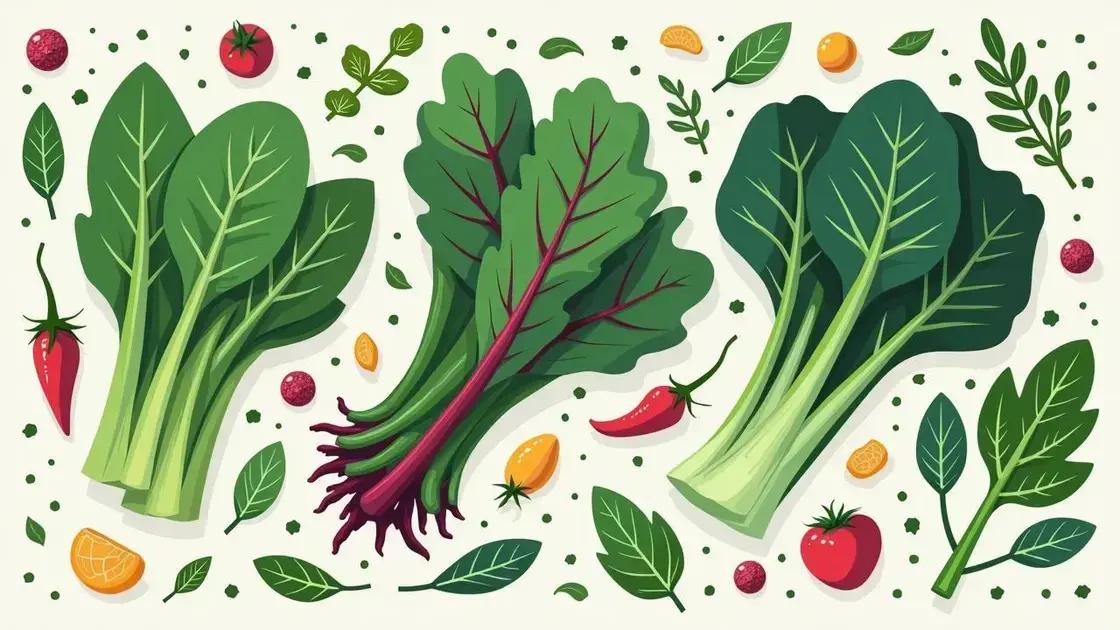Leafy greens, such as spinach, kale, and Swiss chard, are essential for combating oxidative stress due to their high antioxidant content, vitamins, and minerals. Incorporating these nutritious vegetables into your diet supports overall health and can help reduce the risk of chronic diseases.
Leafy greens play a crucial role in combating oxidative stress, a process that can lead to chronic diseases and aging. Rich in antioxidants, vitamins, and minerals, these greens help neutralize free radicals in the body. In this article, we will explore the impacts of oxidative stress, the nutritional benefits found in leafy greens, and how you can easily add them to your meals.
Understanding Oxidative Stress and Its Impacts

Understanding oxidative stress is crucial for maintaining overall health. It refers to an imbalance between free radicals and antioxidants in the body. Free radicals are unstable molecules that can damage cells, proteins, and DNA. They are produced naturally during metabolism but can increase due to environmental factors like pollution, radiation, and unhealthy diets.
When oxidative stress occurs, it can lead to serious health issues. Conditions such as heart disease, cancer, diabetes, and neurodegenerative disorders like Alzheimer’s are linked to prolonged oxidative damage. Oxidative stress also accelerates aging, impacting skin, energy levels, and overall vitality.
Sources of Free Radicals
Free radicals can come from various sources, such as:
- Excessive sunlight exposure
- Smoking and alcohol consumption
- Pollution and environmental toxins
- Unhealthy diets high in sugar and processed foods
The Antioxidant Defense System
Fortunately, the body has a natural defense system against oxidative stress. Antioxidants are molecules that neutralize free radicals, helping to reduce potential damage. These can be found in various foods, especially in leafy greens, fruits, and whole grains.
Understanding oxidative stress and its impacts on the body shows the importance of a balanced diet rich in antioxidants. This can help mitigate damage and enhance overall well-being.
Nutritional Benefits of Leafy Greens

Nutritional benefits of leafy greens are vast and essential for a healthy diet. These vegetables are packed with vitamins, minerals, and antioxidants that support overall health. Rich in vitamins A, C, K, and several B vitamins, leafy greens help maintain proper bodily functions.
Vitamin A is crucial for maintaining healthy vision and a strong immune system. It aids in cell growth and repair. Leafy greens like spinach and kale are excellent sources of this vitamin.
Vitamin C is known for its antioxidant properties. It helps protect the body’s cells from damage and boosts collagen production, which is important for skin health. Additionally, this vitamin aids in iron absorption, making it vital for those who are vegetarian or vegan.
Essential Minerals
Leafy greens also provide key minerals such as:
- Calcium: Important for strong bones and teeth, found in greens like collard greens and broccoli.
- Iron: Essential for producing hemoglobin. Spinach and Swiss chard are good sources.
- Magnesium: Supports muscle and nerve function, found in kale and other dark greens.
Fiber and Antioxidants
High in fiber, leafy greens promote digestive health and contribute to a feeling of fullness, which can help with weight management. Furthermore, these greens are loaded with antioxidants that combat oxidative stress and contribute to overall well-being.
Incorporating a variety of leafy greens into your diet is an easy way to receive these nutritional benefits. From salads to smoothies, these vegetables enrich meals and enhance health.
Top Leafy Greens to Include in Your Diet

Including a variety of leafy greens in your diet is essential for health. Here are some of the top leafy greens to consider:
- Spinach: Loaded with iron, calcium, and vitamins A and C. Spinach can be added to salads, smoothies, or cooked dishes.
- Kale: A nutrient powerhouse rich in vitamins K, A, and C. Kale can be eaten raw in salads or cooked into soups and stews.
- Swiss Chard: Contains a good amount of vitamins K, A, and C. The leaves are mildly bitter and can be sautéed or added to pasta dishes.
- Collard Greens: High in calcium and vitamins C and K. They are commonly used in Southern cooking, often cooked low and slow.
- Romaine Lettuce: A crunchy option high in fiber and folate, great for salads or as a base for wraps.
- Arugula: Known for its peppery flavor, arugula is rich in antioxidants and ideal for salads or as a topping on pizzas.
- Mustard Greens: With a spicy kick, these greens are high in vitamins A, C, and K, perfect for stir-fries or steamed dishes.
Adding Leafy Greens to Your Meals
Incorporating these leafy greens into your meals can enhance flavor and nutrition. Try blending spinach into smoothies, mixing kale in salads, or using collard greens as wraps instead of tortillas.
With such a wide variety, it’s easy to enjoy the health benefits of leafy greens while keeping your meals exciting.
Practical Tips for Incorporating Leafy Greens

Incorporating leafy greens into your meals can be easier than you think! Here are some practical tips to add these nutritious vegetables to your diet:
1. Add to Smoothies
Every morning, toss a handful of spinach or kale into your smoothie. It adds nutrients without changing the taste.
2. Make Salads Exciting
Use a mix of leafy greens like arugula, romaine, and mustard greens to create a base for salads. Adding colorful veggies, nuts, and fruits can boost both flavor and nutrition.
3. Use as Wraps
Instead of using tortillas or bread, try using large leafy greens like collard greens or lettuce to wrap your fillings. This adds crunch and reduces carbs.
4. Include in Soups and Stews
Sauté leafy greens and add them to soups or stews. This provides depth and richness while enhancing nutritional value.
5. Snack on Them
Fresh leafy greens like baby spinach or arugula can be a simple snack. Pair them with hummus or a yogurt dip for a healthy treat.
6. Make Green Sauces
Blend leafy greens with herbs, nuts, garlic, and olive oil to create delicious green pesto or sauces. This can be used over pasta, grains, or proteins.
By using these tips, you can easily increase the amount of leafy greens in your diet, supporting your health and well-being.
Embrace Leafy Greens for Better Health
Incorporating leafy greens into your diet offers numerous health benefits that can help combat oxidative stress and promote overall wellness. From spinach and kale to collard greens and arugula, these nutrient-packed vegetables are rich in vitamins, minerals, and antioxidants.
By understanding the impacts of oxidative stress and the nutritional advantages of leafy greens, you can make informed choices about your diet. Practical tips for incorporating these greens into your meals can make a significant difference in your health journey.
Don’t underestimate the power of leafy greens; making them a staple in your diet can enhance your health and vitality.
FAQ – Frequently Asked Questions about Leafy Greens and Oxidative Stress
What are leafy greens?
Leafy greens are edible plant leaves that are rich in nutrients, such as vitamins A, C, K, and minerals like calcium and iron.
How do leafy greens help combat oxidative stress?
Leafy greens are packed with antioxidants that help neutralize free radicals in the body, reducing oxidative stress and supporting overall health.
What are some popular leafy greens to include in my diet?
Popular leafy greens include spinach, kale, Swiss chard, collard greens, arugula, and romaine lettuce, each providing unique nutritional benefits.
How can I easily incorporate leafy greens into my meals?
You can add leafy greens to smoothies, salads, soups, or use them as wraps. Snacking on fresh greens or making green sauces are also great options.
Are there any specific dietary recommendations for leafy greens?
It’s recommended to include a variety of leafy greens in your diet to maximize nutrient intake and combat oxidative stress effectively.
Can leafy greens support weight management?
Yes, leafy greens are low in calories and high in fiber, which can help you feel full and satisfied, aiding in weight management.













